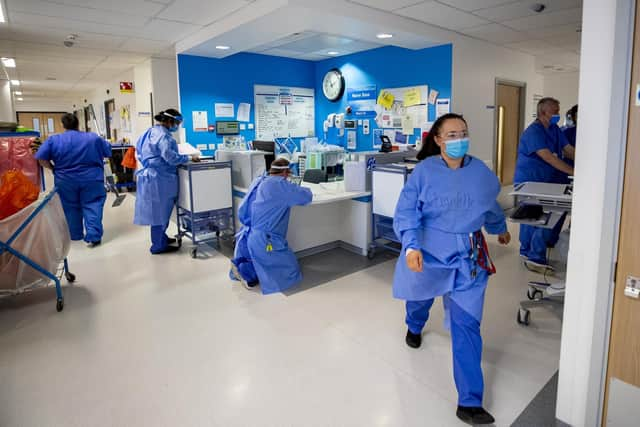Social problems cost Wigan's hospital trust almost £150,000 last year
and live on Freeview channel 276
Charity Crisis said homelessness causes severe inequalities in care, with health issues often going untreated until a critical point.
And figures from NHS Digital shows the cost to the health service of treating patients with social issues across England has almost doubled over just two years.
Advertisement
Hide AdAdvertisement
Hide AdData shows roughly 360 emergency care admissions to Wrightington, Wigan and Leigh NHS Foundation Trust (WWL) had a diagnosis of "social problems (including chronic alcoholism and homelessness)" in 2020-21.


It cost the trust £145,938 to treat patients with this diagnosis over the period.
The number of admissions rose from roughly 260 the year before, and the cost increased from £118,039.
In 2018-19 – the first year such figures were recorded – there were roughly 90 patients admitted with this diagnosis, at a cost of £31,706.
Advertisement
Hide AdAdvertisement
Hide AdThis is clearly not just a problem for Wigan’s hospitals though, which was acknowledged today by local health and social care leaders.
The Healthier Wigan Partnership said that this was an issue that needs to be tackled from several different angles, ensuring that the right help is offered to people in the right places, so there is less need to go to casualty.
A spokeperson said: “Experiencing homelessness and alcohol dependency can have an impact both physical and mental health, and that is why supporting those who present at our Emergency Department with such issues is a key priority for Wrightington, Wigan and Leigh NHS Teaching Hospitals Foundation Trust (WWL) and our partners.
“Working alongside our colleagues across the Healthier Wigan Partnership, there are a number of ways in which we provide a connected approach to support individuals in hospital and in the community.
Advertisement
Hide AdAdvertisement
Hide Ad“As a partnership, we champion people coming forward for the support they need and will work as a system to connect them into the best service to support them at the earliest opportunity to reduce pressures on A&E.
“Our partnership response in relation to preventing and addressing homelessness and our work across the borough ensures that we can respond to accommodation-based issues and provide bespoke support for individuals at both the hospital setting and in the local community. This forms part of a comprehensive personalised support approach aligned to health and wider related support.
“Every patient admitted into the Royal Albert Edward Infirmary through the Emergency Department is screened with health and lifestyle questions including alcohol intake, so that they may be offered support and advice from the hospital drug and alcohol specialist nurse team, funded by Wigan Council and NHS England, if required.
"Our specialist team will always discuss support, treatment plans, advice on withdrawal from alcohol during the time the patient remains in hospital and what support is available after being discharged from the hospital; advice relating to this is also sent to the patient’s GP.
Advertisement
Hide AdAdvertisement
Hide Ad“WWL works with Wigan Council on local initiatives such as the ‘Active Case Management’ pathway, delivered by the community drug and alcohol treatment service, ‘We Are With You’. This programme involves providing intensive support to high risk, complex individuals and helping them with other circumstances that could affect their recovery, such as accommodation or domestic violence concerns.
"The pathway has been in place for a number of years and has been proven to have significantly reduced the number of people admitted to hospital by enabling staff to identify risks earlier.
“Equally, WWL works closely with Greater Manchester Mental Health NHS Foundation Trust (GMMH), to ensure that patients presenting at our Emergency Department with mental health and social needs are provided with one comprehensive package of support.”
The figures also cover a range of other categories – including nutritional disorder, safeguarding abuse, social problems in schools and poor social circumstances – with the diagnosis made by the clinician responsible for the patient attending A&E.
Advertisement
Hide AdAdvertisement
Hide AdMore than 50,500 patients were admitted to NHS hospitals, minor injury units and walk-in centres with issues such as these across England last year – up slightly from 48,300 the year before and 48,700 in 2018-19.
But the cost to the NHS (£21.1m) jumped from £13.5 million in 2019-20, and almost doubled from £11.8m just two years prior.
The Institute of Alcohol Studies said one explanation for this rise could be that people with social problems in 2020-21 had more severe issues when they arrived at emergency departments.
An IAS spokesman said there were increases in higher risk drinking, alcohol liver disease emergency admissions and alcohol-specific deaths that year, but warned any trends during the pandemic are difficult to interpret.
Advertisement
Hide AdAdvertisement
Hide AdDr Alison Giles, chief executive of the IAS, said it is "shocking" to see how much the NHS spends on treating issues including alcohol harm, but said measures such as minimum unit pricing would help bring this down.
She added: "These could be introduced as part of a Covid-19 recovery plan, otherwise we will almost certainly continue to see a rise in admissions and costs, as well as deaths.”
Matt Downie, chief executive of Crisis, said something as simple as lack of ID can make going to a GP impossible for people experiencing homelessness – meaning health issues often are not addressed until a critical point.
He added: "The fact that people are accessing treatment is positive, but the focus must be on getting tailored health care support early on."
Advertisement
Hide AdAdvertisement
Hide AdHe said recent NICE guidelines – which call for specialist services to meet the complex needs of people who are homeless – must be implemented.
In terms of cost, social problems was ranked 25th out of the 37 different types of emergency care diagnosis listed at WWL.
It was responsible for less than one per cent of the trust's £33.6m total costs.
